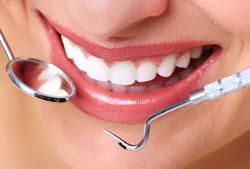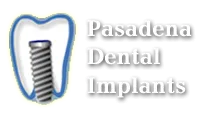
Help! My Tooth is Loose!
- posted: Jun. 02, 2015
 Have you ever been struck in the mouth with a baseball or had an auto accident resulting in a loose tooth? Sure, plenty of kids and adults have, but did you know that the most common causes of loose teeth happen right inside the mouth? A loose tooth may eventually fall out, causing jaw bone deterioration and movement of neighboring teeth toward the empty tooth socket.
Have you ever been struck in the mouth with a baseball or had an auto accident resulting in a loose tooth? Sure, plenty of kids and adults have, but did you know that the most common causes of loose teeth happen right inside the mouth? A loose tooth may eventually fall out, causing jaw bone deterioration and movement of neighboring teeth toward the empty tooth socket.
Why Teeth Loosen
Teeth may become more mobile because of extreme clenching and grinding, especially at night. This condition is called bruxism, and combined with a bite that is uneven or doesn't come together correctly, the intense physical forces exerted on a tooth can eventually overstretch its supporting ligaments and make it wobbly.
Another common and even more devastating cause of loose teeth is periodontitis, or advanced gum disease. Gums and connective tissue pull away from tooth root surfaces when hard tartar collects at and below the gum line. Unless scraped away with regular dental cleanings, tartar causes an infection and gums get red and swollen and recede, along with supporting jaw bone.
According to the Centers for Disease Control and Prevention, this serious dental health issue affects more than 50 percent of American adults over the age of 30. Usual contributing factors are:
- heredity
- poor oral hygiene
- smoking
- some medications
- diet
- health conditions such as diabetes
How to Mend Loose Teeth
When biting forces are misaligned, too strenuous and too frequent, your Pasadena, California periodontist may recommend a custom-fit nightguard. Built to soften the beating that bruxism wreaks on teeth, a BPA-free plastic guard can halt the loosening process and if not too advanced, and allow it to heal.
For individuals with gum disease, periodontists advise scaling or root planing. This procedure scrapes the tartar off tooth surfaces, including the gum pockets that hold damaging bacteria. The gum tissue may then be treated with antibiotics to cure the infection, and antimicrobials to speed healing. Gums often respond well to this treatment, reattaching to the teeth.
With very advanced periodontitis, scaling and medications do not sufficiently stabilize loose teeth. In this case, periodontists apply supportive splints to the top (extracoronal) or back sides (intracoronal) of the teeth. Made of fiber-reinforced polyethylene, these narrow and unobtrusive splints have been used by dentists for years. They work very well to support loose teeth and can remain in place for years.
Splints are applied after tooth surfaces are cleaned and etched. The adhesive is strong, and the splints, exceptionally durable. They are a treatment of choice for teeth compromised by gum disease.
Peter Cooper DDS
Do you have one or more loose teeth? Don't delay in addressing the issue, but contact the office of Dr. Peter Cooper for a consultation. As a skilled and experienced periodontal expert, Dr. Cooper can get to the cause of your dental issue and formulate exceptional treatment options. Call (626) 796-1241 for your appointment.
Pasadena, CA 91101








